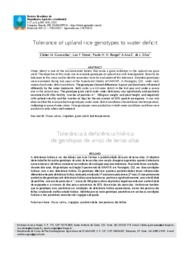Tolerance of upland rice genotypes to water deficit.
Tolerance of upland rice genotypes to water deficit.
Author(s): GUIMARÃES, C. M.; STONE, L. F.; RANGEL, P. H. N.; SILVA, A. C. de L.
Summary: Water deficit is one of the environmental factors that cause a great reduction in the upland rice grain yield. The objective of this study was to evaluate genotypes of upland rice with broad genetic diversity for tolerance to this stress and to identify secondary traits for evaluation of this tolerance. Sixty-four genotypes were evaluated during two years at the Experiment Station of EMATER, in Porangatu, GO, under well-watered and water deficit conditions. The genotypes showed differences in grain yield and were influenced differently by the water treatments, both under a mild water deficit in the first year and under a severe one in the second year. The genotype grain yield under water deficiency was significantly and positively correlated with tiller fertility, number of panicles m-2, 100-grain weight, and plant height, and negatively with spikelet sterility and the number of days for the occurrence of 50% panicle emergence. It was also observed that the most productive genotypes under water deficit conditions showed lower leaf temperature, indicating improved water status. Nine genotypes were productive in both water conditions and three were productive only when well-watered.
Publication year: 2013
Types of publication: Journal article
Unit: Embrapa Rice & Beans
Keywords: Arroz, Deficiência hídrica, Irrigação, Oryza sativa, Temperatura
Observation
Some of Embrapa's publications are published as ePub files. To read them, use or download one of the following free software options to your computer or mobile device. Android: Google Play Books; IOS: iBooks; Windows and Linux: Calibre.
Access other publications
Access the Agricultural Research Database (BDPA) to consult Embrapa's full library collection and records.
Visit Embrapa Bookstore to purchase books and other publications sold by Embrapa.

